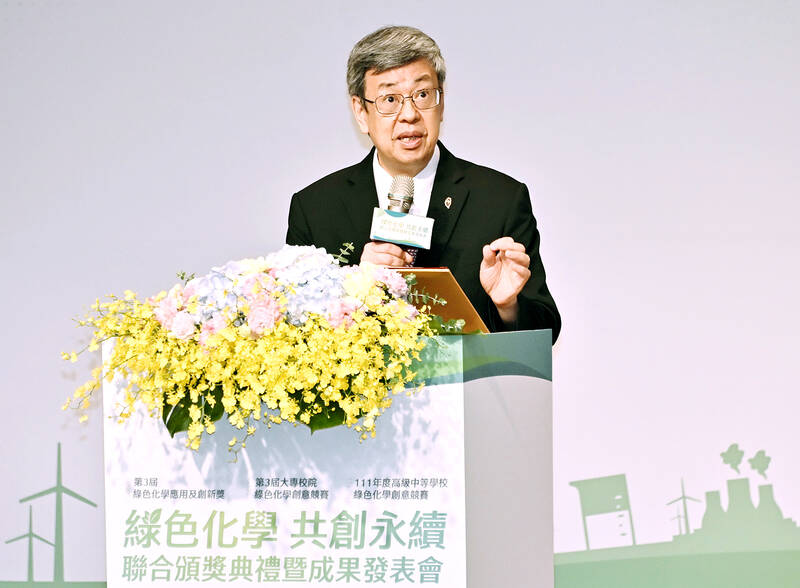An administrative mandate to consider Chinese as Taiwanese citizens was outdated, Premier Chen Chien-jen (陳建仁) said yesterday, a day after the Executive Yuan ordered that agencies disregard the 30-year-old interpretation.
Chen made the remarks at an event held by the Environmental Protection Administration in Taipei following changes to the administrative mandate concerning the Act Governing Relations Between the People of the Taiwan Area and the Mainland Area (臺灣地區與大陸地區人民關係條例).
The previous interpretation of the law was archaic and contrary to the workings of laws and regulations, he said, adding that the order was made to avoid unnecessary problems created by the mandate.

Photo: Chen Yi-chuan, Taipei Times
The Mainland Affairs Council would evaluate whether legislative actions would be needed to amend the law, Chen said.
The Executive Yuan’s change came three months after the High Court ordered the Kaohsiung City Government to pay NT$4.63 million (US$150,579) in state compensation after the accidental death of a Chinese citizen surnamed Qian (錢).
Qian was electrocuted by a malfunctioning street light while cycling in Kaohsiung’s Lujhu District (路竹) during a round-the-nation cycling tour in August 2018.
The man’s family was to receive reparations, despite the absence of reciprocal restitution arrangements with Beijing, as Chinese citizens are deemed Republic of China (ROC) nationals under the law, the court said in its ruling, citing a clarification issued by the Mainland Affairs Council.
This interpretation is contrary to mutual nonsubordination of Taiwan and China, and the apparent difference between Chinese and ROC nationals, the Executive Yuan said.
Starting from the day of issuance, the administrative mandate has been removed, and all government agencies are to amend regulations and policies accordingly, it said.
“That only ROC citizens have the rights of being Taiwanese is the [interpretation] that conforms with the spirit of the rule of law in a democratic nation,” Democratic Progressive Party (DPP) Legislator Michelle Lin (林楚茵) wrote on Facebook yesterday.
The administrative mandate has supported cognitive warfare by China, DPP Legislator Cheng Yun-peng (鄭運鵬) added.
The order from the Cabinet would mean that judges would no longer be required to confer ROC national status to people from China, he said, adding that any such ruling would be “the personal ideological problems of the judge.”
Chinese Nationalist Party (KMT) Legislator Lee De-wei (李德維) was cited by the Chinese-language China Times as saying that the Executive Yuan’s order is a political attack on the integrity of the judiciary and laws.

Intelligence agents have recorded 510,000 instances of “controversial information” being spread online by the Chinese Communist Party (CCP) so far this year, the National Security Bureau (NSB) said in a report yesterday, as it warned of artificial intelligence (AI) being employed to generate destabilizing misinformation. The bureau submitted a written report to the Legislative Yuan in preparation for National Security Bureau Director-General Tsai Ming-yen’s (蔡明彥) appearance before the Foreign Affairs and National Defense Committee today. The CCP has been using cognitive warfare to divide Taiwanese society by commenting on controversial issues such as Taiwan Semiconductor Manufacturing Co’s (TSMC, 台積電) investments in the

INVESTIGATION: The case is the latest instance of a DPP figure being implicated in an espionage network accused of allegedly leaking information to Chinese intelligence Democratic Progressive Party (DPP) member Ho Jen-chieh (何仁傑) was detained and held incommunicado yesterday on suspicion of spying for China during his tenure as assistant to then-minister of foreign affairs Joseph Wu (吳釗燮). The Taipei District Prosecutors’ Office said Ho was implicated during its investigation into alleged spying activities by former Presidential Office consultant Wu Shang-yu (吳尚雨). Prosecutors said there is reason to believe Ho breached the National Security Act (國家安全法) by leaking classified Ministry of Foreign Affairs information to Chinese intelligence. Following interrogation, prosecutors petitioned the Taipei District Court to detain Ho, citing concerns over potential collusion or tampering of evidence. The

‘COMPREHENSIVE PLAN’: Lin Chia-lung said that the government was ready to talk about a variety of issues, including investment in and purchases from the US The National Stabilization Fund (NSF) yesterday announced that it would step in to staunch stock market losses for the ninth time in the nation’s history. An NSF board meeting, originally scheduled for Monday next week, was moved to yesterday after stocks plummeted in the wake of US President Donald Trump’s announcement of 32 percent tariffs on Taiwan on Wednesday last week. Board members voted to support the stock market with the NT$500 billion (US$15.15 billion) fund, with injections of funds to begin as soon as today. The NSF in 2000 injected NT$120 billion to stabilize stocks, the most ever. The lowest amount it

NEGOTIATIONS: Taiwan has good relations with Washington and the outlook for the negotiations looks promising, Minister of Economic Affairs J.W. Kuo said Taiwan’s GDP growth this year is expected to decrease by 0.43 to 1.61 percentage points due to the effects of US tariffs, National Development Council (NDC) Minister Paul Liu (劉鏡清) said at a meeting of the legislature’s Economics Committee in Taipei yesterday, citing a preliminary estimate by a private research institution. Taiwan’s economy would be significantly affected by the 32 percent “reciprocal” tariffs slapped by the US, which took effect yesterday, Liu said, adding that GDP growth could fall below 3 percent and potentially even dip below 2 percent to 1.53 percent this year. The council has commissioned another institution